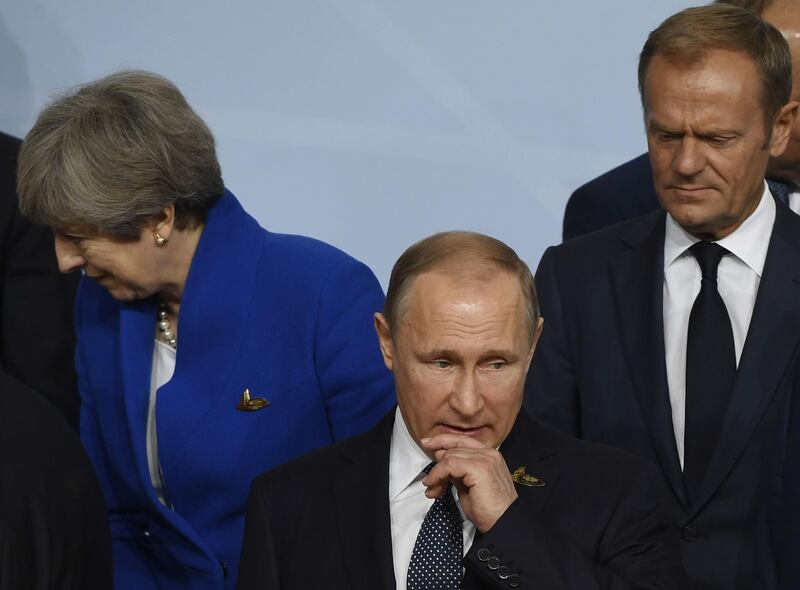It has all the hallmarks of a Cold War-style tit-for-tat that will peter out at some point. However the current crisis between Russia and the western liberal democracies is likely to have surprising staying power and see the Kremlin challenged across multiple fronts in the months ahead.
The US announcement that 63 Russian diplomats would be expelled and a consulate in Seattle shut down was in retaliation for Moscow’s “highly likely” involvement in the poisoning of double agent Sergei Skripal and his daughter Yulia in Salisbury. Britain has already expelled 23 Russian diplomats and intelligence agents and Western European states sent home dozens more.
The Russian embassy in Washington responded in an eye-catching fashion, harnessing Twitter to run an online poll to determine which American consulate in Russia should be shuttered in response.
Days after securing victory in the latest presidential election of his long tenure, President Vladimir Putin is no doubt anxious that the concerted action remains within a well-defined response cycle. Andrey Kortunov, the head of the Russian International Affairs Council, warned Tuesday that some programmes of Western cultural foundations and other non-government organisations, could be shut down, setting the stage for more escalation. “The danger is that you cut channels of communication if you have a crisis like that,” he said. “By cutting these channels of communication we increase the risks. Basically it increases the risks on inadvertent escalation or even a war.
“The level of predictability was higher during the Cold War than it is now. Both sides knew the rules of the game,” he added. “I’m not sure it is the case today.”
Yet there is a groundswell for the retaliation to move into new and more biting phases.
Alexander Vershbow, a former US ambassador in Moscow and Atlantic Council distinguished fellow, told Voice of America that the Skripal attack provided the justification for unparalleled efforts to pressure Mr Putin’s inner circle. “Russian fingerprints were clearly on this attack, and a stiff response was necessary," he said. "I personally think an even tougher response is still justified, including some of the targeted sanctions on the big oligarchs that are close to Putin to show that those who support a system that sponsors aggression of this kind will pay an increasing price if this keeps, if this keeps going.”
As the venue the attack, it falls to Britain to set examples of how much more can be done. As Michael Davenport, the British ambassador to Kuwait wrote on Tuesday, London has taken much solace from the solidarity it has drawn from its friends.
“The whole international community needs to stand together to uphold the rules on which the safety of every nation depends,” the statement said. “If we do not, then the Russian state will continue its pattern of dangerous and destructive behaviour. That is why strong and united condemnation of Russian actions from our friends and allies in Europe, North America and the Middle East has been so important.”
Donald Tusk, the EU council president, has warned Moscow that further measures are certainly not excluded by the countries that threw out intelligence agents this week. Keeping the pressure on allies for more will be a key task for British diplomacy in the weeks ahead.
Francois Heisbourg, one of the leading European strategic analysts, has gone public with his belief that London must tackle the enormous store of wealth that well-connected Russian billionaires have accumulated in London, not least in the ownership of some of the capital’s great properties. “Outside world is also keeping a beady eye on what [the British government] is doing or not doing in terms of cleaning up Londongrad -and I as one am not (yet?) impressed,” he wrote on Twitter.
There is no secret about the properties that could be targeted. One group of activists conducts a bus tour of Russian oligarch-owned homes clustered in west London.
Another avenue is to flush out the shadowy Russian intelligence and disinformation networks. By actively exposing how Russia operates overseas, the British could provide a drumbeat of embarrassment for the Kremlin. As the Russia-hosted World Cup draws closer this summer, Mr Putin would surely be unhappy with the distracting headlines and calls for accountability.
Writing anonymously for the military think tank, Royal United Services Institute, a retired ex-intelligence official proposed an aggressive campaign targeting Russia operatives globally.
“That should include as much as can be publicised about the identities and true duties of those expelled, with illustrative accounts of their operational activities where possible – the Russians publicised film of British intelligence officers working in Moscow when they expelled some of them,” the author said.
“Beyond that, a factually unassailable account of Russian assassination policy and practice should also be issued, including those that have occurred in recent years in Qatar, Dubai, Istanbul, Montenegro and Vienna."






